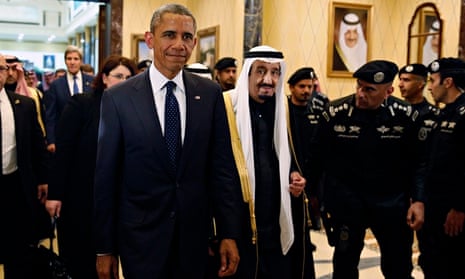Barack Obama has been forced to defend his unwillingness to challenge Saudi Arabia’s autocratic rulers as he led a US delegation to shore up relations with its new king, just hours after lecturing India on religious tolerance and women’s rights.
In a stark display of US foreign policy compromises, the US president cut short his India visit on Tuesday to fly in many of Washington’s top power brokers to pay their respects to the Saudi royal. He conceded the kingdom’s own human rights record would not be on the agenda during security talks.
“Sometimes we need to balance our need to speak to them about human rights issues with immediate concerns we have in terms of counter-terrorism or dealing with regional stability,” Obama told CNN.
Earlier, he risked ruffling feathers in Delhi with a speech that challenged its leaders to do more to protect religious minorities and encourage women in Indian society, prompting some local commentators to question US double standards.
In contrast, White House officials speaking on Air Force One between Delhi and Riyadh made clear they were pleased that the new Saudi King Salman was planning a smooth transition of power after the death of his half brother King Abdullah.
“What they’ve made clear again is that they’re going to emphasise continuity in terms of Saudi interests and the Saudi relationship with the United States,” deputy national security adviser Ben Rhodes told reporters. “So we do believe that Saudi policy will remain quite similar to how it’s been under King Abdullah.”
Obama and top House Democrat Nancy Pelosi were joined in Riyadh by a separate US flight from Germany led by secretary of state John Kerry, which contained a who’s who of US leaders including CIA director John Brennan, Republican hawk John McCain and General Lloyd Austin, head of US Central Command forces in the region.
To emphasise the permanence of Washington’s links to the House of Saud, Obama’s delegation also pointedly included key officials from past administrations such as former secretaries of state James Baker and Condoleezza Rice, and former national security advisers Brent Scowcroft and Sandy Berger.
The US is anxious to maintain the Saudi-driven oil price reductions that have buoyed the US economy but weakened strategic foes such as Russia, as well as cooperation against Islamic State in Syria and Iraq.
The two delegations are also expected to speak extensively about the recent overthrow of Yemen’s government, which leaves Saudi Arabia a rare example of stability in an increasingly volatile region.
Speaking in advance of the four-hour meeting in Riyadh, Obama acknowledged he would not be raising US concerns about Saudi Arabia’s treatment of blogger Raif Badawi, who was convicted of insulting Islam and sentenced to 10 years in prison and 1,000 lashes.
“On this visit, obviously a lot of this is just paying respects to King Abdullah, who in his own fashion presented some modest reform efforts within the kingdom,” he said.
Reporters were able to witness the reception of the US delegation, including most of Obama’s top White House advisers, at the Erga palace in Riyadh, but no public statements were made before they disappeared behind closed doors for a formal dinner.
“Places don’t change overnight, but I think with Saudi Arabia, what we’ve said we support is a reform process that does provide for greater respect for those types of universal values,” added Rhodes in a briefing ahead of the meeting. “But clearly, much more work needs to be done to realise the types of values that the president was talking about in India. And that’ll be a consistent part of our dialogue with all countries around the world.”
Earlier in the day in Delhi, Obama gave a parting speech to students that contrasted with the at-times saccharin feel of a three-day state visit that had been designed to highlight the closeness of the two countries.
Though careful to acknowledge inequality in the US, the president devoted a substantial part of his speech to a lecture on the importance of empowering women in society and addressed a recent spate of sexual attacks in the emerging south Asian power.
“We know from experience that nations are more successful when their women are successful,” said Obama. “These are facts. So if nations really want to succeed in today’s global economy, they can’t simply ignore the talents of half of their people.”
Obama concluded by quoting Gandhi on India’s traditions of tolerance: “He said, ‘for me, the different religions are beautiful flowers from the same garden, or they are branches of the same majestic tree’. Branches of the same majestic tree.”

Comments (…)
Sign in or create your Guardian account to join the discussion